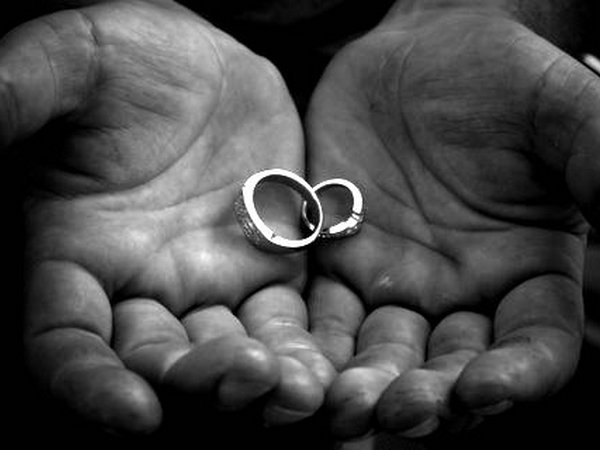 | « Back to article | Print this article |
Revealed! The secret to a happy marriage
A wise man once famously said that the secret to a happy marriage will remain a secret.
But if a recent study is anything to go by, the secret is out of the bag.
For all those who have been wondering how to cajole their respective spouses after an irreparable argument, perhaps you can start by sealing it with a kiss.
In our weekly round up, we bring you all this and more secrets on dating, love and tips to nurture a healthy and long lasting relationship. Read on...
It's not physical attributes, neither is it got anything to do with money. Read on to find out what the secret to a happy marriage is...
A relationship expert has listed out some things help in making a marriage a happy one.
Relationship expert Ty Tashiro has said that the more traits that one picks above the average, the lower the statistical odds would be that they'll find a match.
He said that if there is a room of 100 men, and if one chooses mediocrity -- trifecta of average income, looks and height -- one will have, statistically, only 13 suitors, and when the criteria is increased to an attractive man at least six-feet tall who makes 87,000 dollars, there is only one person left out of the 100.
Add when another trait -- funny, kind, even a political affiliation -- it becomes statistically impossible to find him out of 100 men.
Tashiro, a professor at the Center for Addictions, Personality, and Emotion Research at the University of Maryland, said attractiveness should be kept off the table, as looks are not a predictor of sexual satisfaction, nor do they correlate to happier marriages.
He said that even money does not inspire a happy marriage -- at least over a certain point.
Money makes a difference on the low end of the income scale, but there is "diminishing returns" on happiness in marriage above a financially stable 75,000 dollars-a-year.
Tashiro said that the best personality indicator for sustaining a loving relationship is agreeableness, the New York Post reported.
Agreeableness, as Tashira describes is someone who is "courteous, flexible, trusting, good-natured, cooperative, forgiving, soft-hearted and tolerant."
Please click NEXT to continue reading...
Write a postcard for your Valentine
Click here for more Valentine's Day stories
Height does matter when it comes to love!
Another study on dating reveals that both men and women were particular about the height of the person they were dating.
A new research from Rice University and the University of North Texas suggests that the height of a potential partner matters more to women than men, and the main reason is for femininity and protection.
The study, 'Does Height Matter? An Examination of Height Preferences in Romantic Coupling,' was conducted in two parts.
Part one, which used data from the Yahoo! personal dating advertisements of 455 males (average height of 5 feet 8 inches and average age of 36 years) and 470 females (average height of 5 feet 4 inches and average age of 35 years) from throughout the US, found that 13.5 percent of the men wanted to date only women shorter than they are. In contrast, nearly half of the women -- 48.9 percent -- wanted to date only men taller than they are.
"Evolutionary psychology theory argues that 'similarity is overwhelmingly the rule in human mating," Michael Emerson, the Allyn and Gladys Cline Professor of Sociology, co-director of Rice's Kinder Institute for Urban Research and the study's co-author, said.
"However, our study suggests that for physical features such as height, similarity is not the dominant rule, especially with females," he said.
The second part of the study included 54 male (average height of 5 feet 9 inches) and 131 female volunteers (average height of 5 feet 4 inches) recruited from a US university. The participants answered open-ended questions in an online survey.
The findings were similar to the first part of the study: 37 percent of male respondents wanted to date only women shorter than they are, while 55 percent of female respondents wanted to date only men taller than they are.
According to the study data, the dominant reasons females cited for preferring a tall partner are matters of protection and femininity.
Men were much less likely to say that height mattered, and for those that did, they preferred shorter women, but not so short that it would cause problems with physical intimacy.
George Yancey, a professor of sociology at the University of North Texas and the study's lead author, believes that the height preferences of men and women can be explained by traditional societal expectations and gender stereotypes.
He noted that it is a widespread perception that tall height is a personal asset for men and a personal liability for women.
He said that the study's finding that height matters more to women supports the social system of patriarchy, in which males are the primary authority figures.
Can your body help you find love?
If only you knew how to control the enzymes in your body, it would perhaps help strengthen your love life.
Do you know that your body plays a significant role when you are falling in love with somebody? Or that it helps strengthen your bond with your special someone?
The chemistry of love is the subject of the latest episode of the American Chemical Society's Reactions YouTube series.
The video explains how feel-good neurotransmitters like dopamine and oxytocin fuel lifelong pair bonds in prairie voles, which -- along with humans -- are the mammalian kingdom's leading monogamists.
If you block oxytocin receptors, you can totally cut off that pair-bonding response, Abigail Marsh, associate professor of psychology at Georgetown University, explained.
Marsh asserted that people who excite romantic feelings in us also probably trigger increases in oxytocin, which results in an increase in dopamine, and then we find that person to be someone we want to stick with.
In the video, Marsh also explains that addictive drugs affect the brain in ways similar to love -- which helps explain the painful, withdrawal-like symptoms of heartbreak.
Satisfying relationship can help couples weather a storm
Exchanging negative communication can do more damage to unhappy couples as against couples who are in a satisfying relationship.
Being critical, angry and defensive isn't always a bad thing for couples after they have a big disagreement -- provided they are in a satisfying relationship, a new research has suggested.
The study by a Baylor University psychologist said that in that case, they likely will have a "big resolution" regardless of how negative they were during the discussion.
Keith Sanford, PhD, associate professor of psychology and neuroscience in Baylor's College of Arts and Sciences, said his goal was to understand conflict resolution as a process that involves change.
He recruited a sample of 734 people in heterosexual marriages or cohabitation relationships.
Each participant completed an Internet questionnaire that involved identifying a recent relationship conflict and answering questions about his or her use of negative communication.
Importantly, participants also rated how upset they felt when the conflict was at its peak and also how they currently felt about the conflict.
He said that he used the difference between these two ratings as a measure of the extent of progress participants made toward resolution.
Sanford explained that people in satisfying relationships resolved their conflicts regardless of whether they used negative communication or not. In contrast, people in unhappy relationships tended to have big conflicts, and they tended to have trouble resolving their conflicts -- and this was often true regardless of the type of communication they used.
To the extent that negative communication played any role, it appeared to be detrimental for resolution, but this effect was mostly negligible, Sanford said.
The study has been published in the Journal of Social and Personal Relationships.



